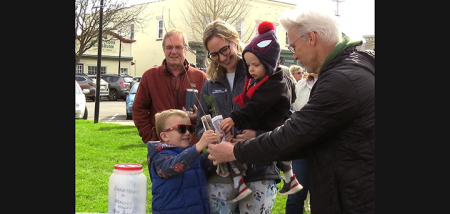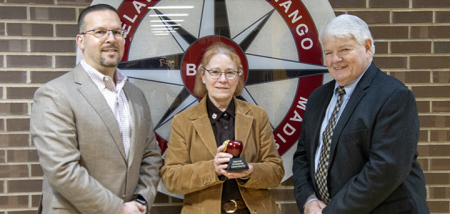Tilting At Windmills: THE GPS MURDER – Chapter 7
Published:
May 24th, 2024
By:
Shelly Reuben

As Chief Upton studied Clarence Liverpool’s shark-like eyes and glared at the lawyer’s small and twisted ears, he recalled an unpleasant memory of … of …where had he…?
Then it all came back to him. Sam had been sixteen-years old. His father, Abraham Upton, was sixty-three. Four years earlier, Abe’s physician had told him that he had Parkinson’s disease, a diagnosis that turned his world upside down, but did not upset his equanimity. Abe responded with neither outrage nor self-pity. He accepted his fate, sold his rental properties in Springfield, dissolved his real estate company, and stopped driving his car.
But he still attended parent-teacher meetings; he still accompanied Sam to Boy Scout outings (although the campouts were becoming difficult); and he still attended family reunions and Memorial Day Parades.
The Madison Heights Chief of Police knew, and had always known, that when it came to his childhood, he and Maddie had lucked out. Both of his parents were funny, kind, contented souls with happy hearts. When Sam brought home report cards with grades no higher than a “C,” his father’s response was to hug him and say, “I was no scholar either.” When Maddie got cast as a shrub (no speaking lines) in the school play, Abe had hugged her, too, and said, “Sarah Bernhardt wasn’t built in a day.”
After struggling against the effects of his disease for several years, Abe decided that he might slow its progression if he kept his mind and body active by going back to work. For forty years, he had bought, sold, and rented properties, so it was to realtors that he applied for a job.
Sam was with him the entire time.
He saw the interminable and uncomplaining efforts that his father put into his search for employment. He saw a man who endured and did not complain. Every day, Abe opened The Yellow Pages Telephone Directory. Every morning, he gripped a pencil in his trembling hand, underlined boldfaced names, dialed telephone numbers, and asked this management company or that if they could use a man experienced in real estate to sell their empty lots, homes, buildings, or stores.
And Sam Upton observed, his heart breaking each time, as all, without exception, turned his father down. Not hiring. Not interested. No can do. Stop calling. Go away. GO AWAY!!!
Never discouraged and never despondent, Abraham Upton persisted. He called more phone numbers on more pages and after every call, drew yet another line through another boldfaced name. Only the last realtor that he telephoned expressed interest.
Sam could not remember the location of the dreary strip mall to which he drove his father on that terrible day. Nor could he recall the realtor’s name. But he remembered the man’s gray shark eyes, and the man’s ears, small and twisted like squashed paper cups.
Abe Upton ... Sam’s dearly beloved, gentle father, his mind as lucid as a sunny spring day but his declining body unable to keep up, shuffled unsteadily to the realtor’s desk.
“So,” Clarence Liverpool sneered, “you want a job.”
“Yes, sir,” Abe replied tentatively, the two syllables sounding humble, apologetic, and insecure in his son’s ears. Sam gasped.at the unexpected air of humility. This was his father speaking. A mountain of a man. A lion. A tiger. A hometown hero. A gentle giant.
Clarence Liverpool jutted out his jaw.
“You think you can sell my buildings?” He snarled.
“Yes, sir,” Abe said softly. “I have been selling buildings my whole life.”
The realtor’s lip curdled with contempt.
“Maybe when you were younger you could sell an empty lot, or a compost heap, or a slum. But you’re an old man now, Mr. Upton. Aren’t you?”
Sam’s father said nothing.
“You are a sick old man, Mister Upton. You are old, feeble, and pathetic.”
Abe raised his head, but he did not raise his voice. He said firmly, “I can do the work.”
Clarence Liverpool snapped. “No, Mister Upton, you cannot do the work. You drool when you talk. Your hands shake. Look at your hands. Hold them out and look at them.”
But Abe left his hands where they were. He turned to his son. “We can go home now, Samuel,” he said.
The sixteen-year-old rushed forward to help his father to his feet. Sam was seething with rage. Hating the realtor’s smug face and scornful mouth. Hating his cruelty. Hating him for trying to humiliate the kindest and mildest man in the world.
After that terrible interview on that terrible day, Sam’s father made no more telephone calls and applied for no more jobs. He remained at home. His condition worsened. He slept more. And one sad day, he died.
For many long years, Sam fantasized about killing Clarence Liverpool. But time passed and reality intervened. First the future police chief helped his mother to sell their house in Springfield and move to South Carolina, where she would be nearer to her sister. Then he went to college. Not long after he graduated, he became a police officer. A deputy chief. And finally, the Chief of Police.
He solved cases. He fell in love.
And Samuel Upton forgot about the incident.
To be continued next week …
Chapter 7 of 8. See previous chapters beginning on Friday, April 12. Or check link to author archive…https://www.evesun.com/authors/31
Copyright © Shelly Reuben, 2024. Shelly Reuben’s books have been nominated for Edgar, Prometheus, and Falcon awards. For more about her writing, visit www.shellyreuben.com
Author: Shelly Reuben - More From This Author
Comments









